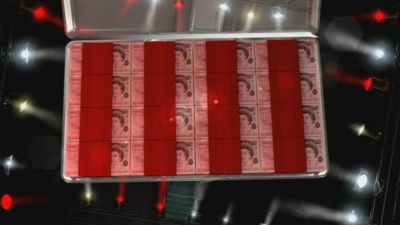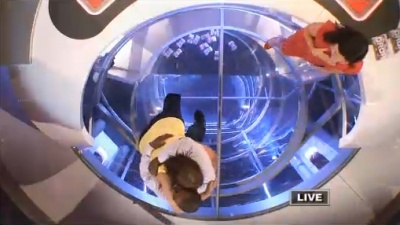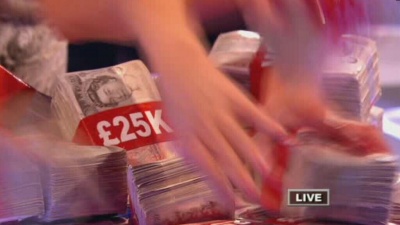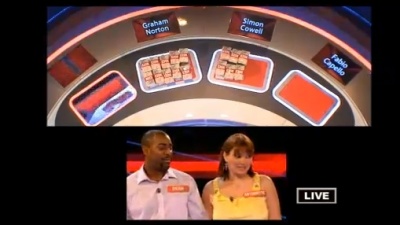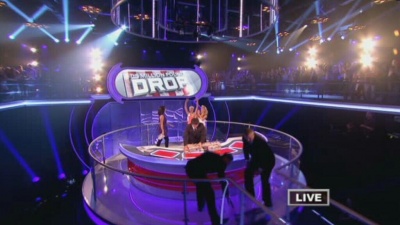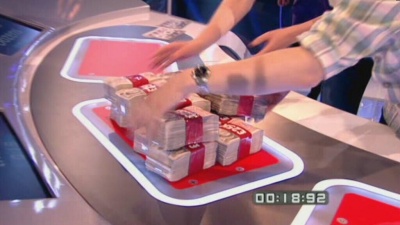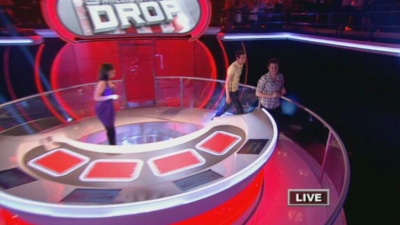Weaver's Week 2010-06-27
Last week | Weaver's Week Index | Next week
The Million Pound Drop Live
Remarkable Television (an Endemol company) for Channel 4, 23-29 May
Before this show went out, host Davina McCall spoke with Richard Bacon on the radio. She explained how her programme worked, and made the telling point that it was all going to be done live. Television produced without the safety net of a recording always has a certain frisson, as there's no chance of a second go. There will be frayed edges, there will be cameramen creeping into shot, there will be the occasional stumble. If the whole programme is making for incomprehensible television (as Channel 4's live Dispatches did this week), tough, it's going to have gone out before the critics have even started sharpening their quills.
Davina's chat made for an unusual interview, not least because Mr. Bacon was talking game shows and didn't discuss the rules of 19 Keys once. They're really not that hard! That said, compared to the rules of The Million Pound Drop Live, they are complex. Contestants are given a million pounds in cash. They're then asked eight questions, and must stake all their money on one or more answers. Whatever they have left after eight questions, they keep. No messing about with keys, no big red buttons to press, no-one shouting "Lucky 7" at intervals, just eight questions and a million pounds in cold hard cash.
The ideal set for The Million Pound Drop Live would have been the rickety building from children's programme Trapped. Here, unfortunate children progress from level to level by jumping down the gap, with only the best making it to the base and freedom. We would have loved to have seen an eight-story building, with holes in the floor opening underneath the money, and the contestants journeying down the building with their dosh.
Sadly, in these recessionary times, Channel 4 couldn't afford to pay the fees necessary for hire of The Voice's tottering tower. Instead, the set had to be constructed at Three Mills studio in east London. The players were fixed in position, on a raised platform above the main studio, and below the audience. If they'd gone to the Trapped! set, the audience would never have got in, never mind out. Rather than the money dropping on right answers, an incorrect answer ensured that the amount staked would disappear from play, to be retrieved by two men dressed as security guards.
For all the flummery, this was a tremendously simple programme. Indeed, it's only the second new pure quiz (as opposed to guessing game, or bluffing game) since 2002 to offer prizes of more than £100,000 as routine. (The other? ITV's Duel.) There are no lifelines, just one million pounds, divided between answers where the players are unsure. What's left after eight rounds, they take home.
The actual execution was a little bit more involved than that, of course. The prize – twenty thousand used £50 notes – was bundled into units of £25,000, and these bundles couldn't be split at all. That's forty bundles of 500 notes, each about the size of a hand, and weighing a few ounces. For every question, each of the forty bundles had to be moved, by hand, onto one of the four doors available, and then the winnings had to be moved clear before continuing.
All of this shuffling about made for poor television, a bit of a mess. The dropping doors were just a little bit too small, the bundles were just that bit too numerous, there was no device like a roulette rake to move the money back quickly and speedily, so Davina had to fill. She's very good at filling, but it's clear she was covering up a slight hole in the execution.
Also a problem, at least on the opening night, was the speed of play. It was far too slow, there were tremendous pauses before each individual incorrect answer was revealed. Get on with it, we thought, we could have solved this years ago. Mercifully, the second show featured two – and sometimes three – incorrect answers being revealed at once, and by the end of the week this problem was a mere memory. Such are the advantages of live television, it can adapt to criticism as the series progresses. There's no criticism of the one-minute limit for the response to each question – it's long enough to shift the dosh and debate the answer, and if the contestants aren't going to get it in the time allowed, they could be here all night. This is a quiz show, not a tennis match.
Big prize or no, it's a quiz, and any self-respecting quiz requires questions. Though the contestants could pick from two categories offered, we're putting the question styles into three categories. By far the smallest category was the straightforward Millionaire-style general knowledge question, with one right answer and some wrong ones in a greater or lesser disguise. There were many questions exploiting the live nature of the show, and some of the best tested other areas of knowledge. For instance, the seemingly innocuous "In which of these cities is it 30° C right now?" required the contestants to know their geography, but also to know something about time zones and the way temperatures rise and fall during the day – if it's 10pm in the UK, it needs to be mid-afternoon somewhere for it to be really hot.
By far the largest category was a sort-of reverse Only Connect question, giving four items in a theme and asking which of them was first / largest / oldest / some other superlative. These questions are like a Big Guy burger – welcome as part of a healthy, balanced quiz diet, but too many of them are not healthy. Man cannot live by best-of-four alone.
There was another nuance to the format: every question had to carry the prospect of elimination. The contestants were allowed to split their money over only three options, they had to leave one question completely free of cash. If the one they'd left was the correct answer, every last one of their forty bundles would fall down the chutes, and the contestants would head home with nothing more than the dubious honour of having been on the television for a little while. Even if the contestants didn't know, they had to make some sort of decision. In fairness, the producers often helped out by throwing in an answer that would be wrong with a moment's thought, but that was never guaranteed.
As the contenders neared the end of the eight questions, and their pile of cash dwindled, the producers threw another twist into the works, reducing the number of possible options from four to three, and on the final question just two choices were presented. Reducing from four to three options had merit – it makes it somewhat more likely that a team will progress from question five to the finale. We're actually less convinced about making the final question an all-or-nothing gamble, particularly when the question is of the form "Which is taller: Tweedledum or Tweedledee?" They may as well have asked "Heads or Tails", and run the risk of Justin Lee Collins bursting in and claiming that they're ripping off his show.
And speaking of ripping off other shows, our attention is drawn towards RTL's programme Succes Verzekerd. This show first aired in the Netherlands in 2008, and begins with a list of seven categories. To win, the contender will play all seven questions. The first one has three answers, the next has four, and so on until the player has nine answers for their last question. The player has two lifelines; one allows them to be told the answer, at the cost of half their money. The other lifeline, which they can play three times, allows the player to split their money across the various answers; the player can, for instance, put €500 000 on one answer and €100 000 on each of the remaining five. Not putting any money on the right answer means the player leaves the game with nothing.
Is Million Pound Drop Live a rip-off of Succes Verzekerd? Though it's a bit similar, the idea of spreading money is in common, that's actually about it. It's a bit similar, but there are clearly enough differences to pass muster. Perhaps the biggest is that Million Pound Drop Live – like Duel – is a tactile show, part of the game is the physical movement of real money; the Dutch programme is all numbers until the final moments. Indeed, not since Sale of the Century has the prize been in the studio to tempt the contestants.
A couple of weeks ago, we noted that Mission 2110 owed a good deal of its success to the web game, filling in that show's complex back story. The Million Pound Drop Live also had its own web game, one that exploited the live nature of the show. People went to the Channel 4 website, and played the same questions in the same way as the contestants, starting with a million pounds and hoping to keep it all until the end of the programme. Davina was able to make references to what was happening in this online game, saying that so many thousand players had kept their million up to the break, or that so many virtual squillions had been lost on that one question alone. Virtual squillions, Mr. Osborne, it's not real money. Other than the fact that the online players were able to move their moolah with a mouse click, and they didn't have to stand on their marks, it was almost like being in the studio with Davina.
The contestants all fitted a particular mould – they were young and aspirational, not a million miles away from the perpetual Big Brother demographic. We would have wished to see someone a little older, to demonstrate how these whipper-snappers should do it. Though the questions tilted in the direction of pop culture, any winner would require knowledge of many subjects, and – unlike Big Brother – the show didn't prove to be absolutely toxic to older viewers.
There was a remarkably persistent rumour that the losing contestants on Million Pound Drop Live would be fast-tracked into this year's Big Brother. Quite where this rumour came from we don't know; it's true that both of these are Endemol productions, going out at 10pm on Channel 4, and Davina McCall hosts some shows, but that's all. However, we do have one question: were these contestants from last year's Big Brother, the series no-one watched?
We're pleased to see that ratings held up throughout the week – the average of 2.2 million viewers is up about 400,000 on the typical return for that slot. We're also pleased that another week's production is going to be made later in the year. Here's some ways to make a good production even better:
- Make the trays large enough to contain a million pounds easily, this is a test of knowledge not of stacking.
- Or put the £25,000 bundles on small plastic trays, so that the contestants start by moving around units of £100,000 and they can split them later in the show. Anything to reduce the fluff accumulated while moving the dosh about.
- Small plastic trays would also help Davina to count the money on sight; the alternative is to invest in sensitive scales beneath each trapdoor, so that they can weigh the money and work out the stake automatically.
- Investigate ways of putting the question, as well as the answers, on screen. Is there room at the top of the shot?
- Don't worry about the lack of a catchphrase, let one emerge naturally.
- Keep the web game, that doesn't need changing.
This Week And Next
This is a bit bobbins! We regret to report the death of Chris Sievey. In character as Frank Sidebottom, he was a regular on Channel 4's cult Remote Control game show.
We must also report the death of Anthony Quinton, the Oxford don, chairman of the British Library, Lord Quiton of Holywell, and intellectual Titan. He comes under this column's purview from his time setting questions for, and hosting, Radio 4's Round Britain Quiz, a job he got when he auditioned to be on the panel only for the producer to find that Quinton's erudition and analysis meant he would always win.
Which is more appealing: Big Brother or Junior The Apprentice? The viewing public didn't reach a firm conclusion in the second week of June: Junior The Apprentice was the single most-watched game show transmission of the week, with 5.4m seeing the show finish on Thursday, but 4.9m saw the start of Big Brother on Wednesday, and that was more than Mr. Sugar attracted. Third on the popularity list was Dickinson's Real Deal (3.6m), and Millionaire came fourth with 3.35m – both of these ITV shows had their highest rating of the year. Come Dine With Me had over 2.5m viewers for three prime-time editions this week, and 810,000 for repeats on More 4. Britain's Got Talent US (675,000) and QI XL on Dave (390,000) rounded out the top three; the lower places included a welcome repeat of Only Connect (225,000 on BBC4) and Fferm Ffactor (57,000 on S4C).
We were rather tickled to read a piece on Het Grauniad's bewties this week asking why a woman is always first out of the Big Brother house. The article didn't actually offer any answers, it just spent 461 words expounding the same point this column made last Sunday, and in a mere 92 words. For any other journos looking for questions we'd like answered, here's three. Difficult: is Big Brother encouraging Shabby's crush on Caoimhe purely for ratings, or to demonstrate that sexuality doesn't divide people from common emotions. Easy: "There are microphones and cameras everywhere." Why does this statement surprise absolutely no-one? Patronisingly simple: list all the positive achievements George Lamb has brought to television and radio (Write on neither side of your paper.)
Ball sports in south London and South Africa dominate the schedule, and may even move the great Mark Labbett from his place in ITV's daytime. Even Scrapheap Challenge' (C4, 5.25 Sunday) is talking football, and Tim Vine has an overdue return to Countdown (C4, 3.25 weekdays). Other than that, the highlight of the week is, er, erm, Còcaire nan Còcairean appearing on STV (11.35 Tuesday) and another chance to see the Bamzooki final (BBC2, 10.05am Saturday). We'll have a longer highlights list for you next week.
To have Weaver's Week emailed to you on publication day, receive our exclusive TV roundup of the game shows in the week ahead, and chat to other ukgameshows.com readers, sign up to our Yahoo! Group.

